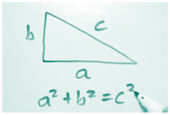I’d heard dozens of middle and high school mathematics teachers express frustrations like Tom’s. So when I was invited to talk on teaching mathematics from a Christian perspective at a recent in-service day for high school teachers, I jumped at the chance. I had recently coedited a volume of essays presenting a Christian perspective on mathematics (Howell and Bradley 2001). The book was intended for college students and Christian scholars, but I was sure it was just what these teachers needed. I didn’t spare the philosophical jargon as I talked about ontology, epistemology, truth, and the “unreasonable effectiveness of mathematics.” I could sense my audience’s dissatisfaction, and as I asked for questions, one teacher spoke for all the others. “Look, Jim,” he said, “we don’t have time to think through how to apply all of these philosophical ideas in our teaching. We have several classes to meet each day, homework to grade, family responsibilities, and a myriad of other things happening in our lives. We need something practical that we can use every day.” The others all nodded in agreement.
As we drove back to Grand Rapids, I recounted my experience to my friend, David Smith. David is a professor of German, and he had recently been appointed the director of the Kuyers Institute at Calvin College. The Institute was founded (and funded) by Milton Kuyers, a man with a deep love for Christian education and a desire to advance it around the world. “I think they are right, David,” I said. “They need something more concrete than what I have to offer them.” David took me completely by surprise. “I think the Kuyers Institute would be happy to receive a grant proposal from you to write such materials,” he said. As we talked, I learned that David had worked for several years with a project in England that had already developed some materials for teaching mathematics from a Christian perspective and he was eager to see that work continue.*
 And thus, just over a year later, I sat around a table with Gary Talsma and David Klanderman, mathematics education professors at Christian colleges; and Eve Ricketts and Andrew Busch, high school mathematics teachers. We discussed how we might work together to write some materials to help middle and high school mathematics teachers apply a Christian perspective to the content of their teaching. We had agreed with the Kuyers Institute that the materials were not to be sold but were to made available at no charge over the Internet so that they might be accessible not only to Christian schools in developing countries since those schools cannot afford American textbooks but also to Christian schools in wealthier nations. As we discussed this principle, I was particularly grateful to have Eve as a part of our team because she had grown up in India and completed all her schooling there. We also agreed on the following themes, which we would aim on integrating throughout the materials:
And thus, just over a year later, I sat around a table with Gary Talsma and David Klanderman, mathematics education professors at Christian colleges; and Eve Ricketts and Andrew Busch, high school mathematics teachers. We discussed how we might work together to write some materials to help middle and high school mathematics teachers apply a Christian perspective to the content of their teaching. We had agreed with the Kuyers Institute that the materials were not to be sold but were to made available at no charge over the Internet so that they might be accessible not only to Christian schools in developing countries since those schools cannot afford American textbooks but also to Christian schools in wealthier nations. As we discussed this principle, I was particularly grateful to have Eve as a part of our team because she had grown up in India and completed all her schooling there. We also agreed on the following themes, which we would aim on integrating throughout the materials:
- Mathematics helps us see the order and beauty of God’s creation and thus of God Himself. Hence, mathematics derives its purpose, meaning, and value from God. Discussion of these themes can be a legitimate and valuable part of mathematics education.
- Teachers should enjoy mathematics, receive it gladly and thankfully as God’s gift, and cultivate a classroom climate in which students enjoy it and want to do it. Educational materials should support teachers in doing this.
- Teachers need to show students explicitly how mathematics fits into our God-given stewardship of the earth and into the building of human communities. For example, teachers need to explain ways that people have used mathematics to advance principles such as justice, responsible stewardship, and community building as well as ways that people have misused mathematics.
- For much of the twentieth century, an abstract approach devoid of context dominated mathematics. By contrast, a Christian approach says that mathematics is not autonomous but rather is an aspect of an interconnected creation. Thus, teaching needs to be contextual—it needs to establish clear connections with other subjects and with the practicalities of life.
- Unlike the ancient Greeks and their intellectual descendants, we as Christians do not despise the physical and glorify the mental and abstract. Rather, we value our bodies as God’s creation. Thus, teachers should, as much as possible, use teaching methods that actively engage students’ minds and bodies by means such as using manipulatives and having students collect and analyze data.
- Teachers need to discuss in their classes how the surrounding cultures view mathematics and how a Christian perspective differs. For example, until fairly recently, the United States and Western Europe overemphasized human reason. Now these cultures have swung in the other direction, tending to undervalue reason and overemphasize intuition. Asian, South American, African, and Western countries tend to value mathematics solely for its economic benefits, without considering that pursuing economic gain apart from a broader framework of godly service can be harmful.
- Students often think of mathematics simply as recipes for how to do problems. Teachers need to foster an attitude of deeper reflection on what mathematics can and cannot do for human beings, on the wonder of this gift from God, and on what its order and beauty tell us about God and His creation.
We did not need to develop separate Christian textbooks for mathematics; many excellent secular textbooks present the mathematical content. Rather, we needed to focus on supplementing those books with materials that would help students see mathematics from a Christian perspective.
We talked through lots of ideas, and at end of our day together, we had sketches in place for nine chapters. These chapters and the accompanying instructor supplements were written over the next year and subsequently edited, class tested, and formatted by two skilled textbook designers. The chapters are as follows:
- Why Study Math?
This chapter asks students to read several famous statements (and some not-so-famous ones) about the value of mathematics. It also examines excerpts from Scripture. The goal is that students will come to see God’s purposes in enabling us to do mathematics—that we might worship Him and serve as stewards of His creation. - Mathematics, Modernism, and Postmodernism

Students often don’t realize that there can be a Christian perspective on mathematics that differs substantially from the perspectives on mathematics held by the cultures that surround us. The goal of this chapter is that students will see those differences, embrace a Christian perspective, and be better equipped to deal with secular influences on their lives. - Fibonacci Numbers and the Golden Ratio
An algebra or geometry course could include this chapter. It focuses on what the natural world is like and how mathematics helps us perceive and understand some of the order, beauty, and harmony that God has built into it. - Exponential Functions
Applicable in an algebra course, this chapter addresses the role of mathematics in helping us be better stewards of creation. Applications include pollution, energy usage, and saving for retirement. - Hypercubes
In this chapter, students explore a procedure to generalize the concept of a 3-dimensional cube to both lower and higher dimensions, investigate and compare a variety of ways to represent 3-D and 4-D cubes, and examine the relationship between an n-cube and the number of lower-dimension cubes that are components of the n-cube. The chapter encourages students to think about the implications that being created in God’s image has for both the power of human reasoning and the limitations of it. - Paper or Plastic? No, Thanks!
This chapter helps students improve their understanding and skills in classifying polynomials, in describing the shape of their graphs, and in using a polynomial function to model real-world data. The spiritual theme is, again, stewardship of God’s creation and the role of mathematics in being good stewards.
- The Indian Ocean Tsunami: December 26, 2004
In this chapter, the Indian Ocean Tsunami of December 26, 2004, serves as a backdrop to study the mathematics of trigonometric functions, logarithmic scales, and the quadratic function. This unit focuses on some natural tragedies, how mathematics can help us understand these, and how it can help us respond to them. - The Gender Gap
Through this chapter, students develop an awareness of social justice issues in our society, particularly gender equality, and how mathematics can help us address them. - Simpson’s Paradox
In this chapter, students work with two-way tables, proportions, and percents. Students also encounter ideas related to data analysis by observing Simpson’s paradox when viewing aggregates of data. The goal of this lesson is to encourage students to become wary of making decisions before seeing all the evidence or before hearing both sides of an argument. As Christians, we have the job of understanding the information presented to us and interpreting that information in a God-pleasing manner.
These chapters help students do the following:
- See God’s purposes for mathematics
- Become more able to discern the perspectives on it found in the surrounding cultures
- See how mathematics helps us understand God’s creation and serve as better stewards of it
- Be better able to understand both the wonder and the limitations of God’s gift of reason
- See how mathematics plays a critical role in the establishment of social justice
The Kuyers Mathematics materials are currently available. Teachers who have used them tell us that their students have enjoyed them and have learned a great deal from using them. The student version can be downloaded. We make the instructor version available through sending it as a CD or emailing it. Readers may obtain the instructor version by sending a request on their school’s letterhead to the following address: The Kuyers Institute, 3201 Burton St SE, Grand Rapids, MI 49546. We invite mathematics teachers who are interested in being authors to write additional units for the Kuyers Mathematics materials. Once the submitted materials are edited and successfully tested, they will be added to the Kuyers collection. Author guidelines are also available at the above Web address.
* The materials are called the Charis Project.
Reference
Howell, Russell W., and W. James Bradley, eds. 2001. Mathematics in a postmodern age: A Christian perspective. Grand Rapids, MI: Wm. B. Eerdmans Publishing.
James Bradley earned a BS in mathematics from MIT and a PhD in mathematics from the University of Rochester. He has conducted research in game theory and has served as a visiting scholar for the U.S. Department of State. Besides writing several college textbooks, Dr. Bradley has written books and articles that address the relationship between mathematics and Christian belief.
Download a PDF of this file.
